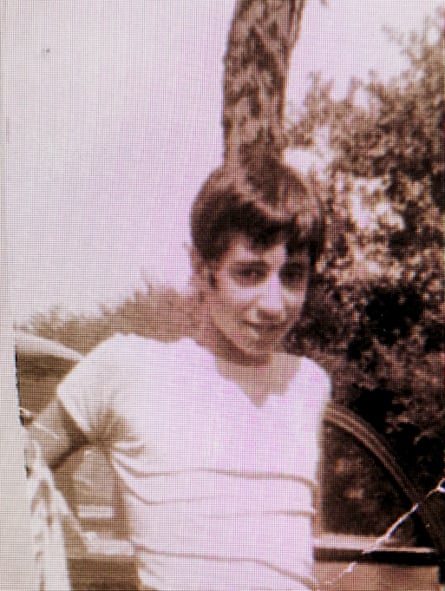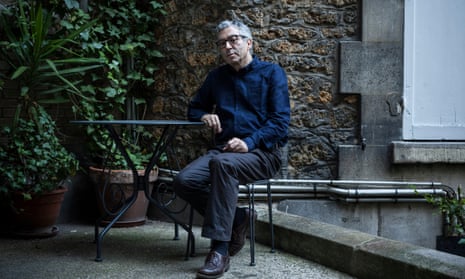When Didier Eribon escaped the homophobia and casual racism of an impoverished life on a housing estate in northern France and arrived in Paris in 1964, he came out of one closet and went into another. It was much easier to tell his clever, cosmopolitan new friends that he was gay than to admit to being working-class. So he lied. “My coming out of the sexual closet, my desire to assume and assert my homosexuality, coincided … with my shutting myself up inside what I might call a class closet,” he writes in his critically acclaimed bestseller Returning to Reims, published in the UK next month.
Eribon’s name is little known in Britain outside intellectual circles, in particular King’s College Cambridge, where he has been a visiting fellow. Until recently, he was best known in France for his biography of the philosopher and social theorist Michel Foucault, and for his writing on gay male identity. Returning to Reims, part-memoir, part-social and political theory, caused a stir in France, and has sold around 90,000 copies, but it approached cult status in Germany where it touched a nerve with its central premise that the mainstream left is to blame for pushing the working classes towards the far right and nationalism. Now the book, and Eribon, are coming to Britain.
Returning to Reims is a compelling and poignant story of reinvention and belonging. The central themes echo those in The End of Eddy, Édouard Louis’s 2014 autobiographical novel about growing up gay and poor in a desolate post-industrial town in northern France, which is dedicated to Eribon. In fact, Returning to Reims, published in French in 2009, came first, and Louis credits Eribon for inspiring him to write his own story. “I was overwhelmed by his book. I felt I was reading the story of my life,” Louis wrote. The pair met at Amiens University, where Eribon was a professor and Louis a student. Eribon recalls: “He came to speak to me after I gave a talk on my book. I knew at once this was an exceptional young man, and it was the start of a great friendship.” He and Louis will give a talk in London in June.
Eribon, 64, is proof that you can take the man out of the working class and turn him into a bestselling international writer, philosopher and sociologist, but you cannot take the working class out of the man. “You can never escape your social class, even if you believe you have,” he says. “That’s how the system works – it keeps people in their place: the dominant and the dominated.”
His book recounts how, after decades in Paris, the by now successful, renowned and openly gay Eribon feels caught between classes, still ashamed of his roots but still silently seething when one of his intellectual and social peers is condescending or insulting about the working classes.
“What was difficult was not being gay but being working-class,” he says. “People who say they are proud to be working-class are really saying they are proud to no longer be working-class.” I escaped my background but I was still ashamed to admit it or make reference to it. I was ashamed of my family, of their habits, even of the way my mother pronounced words.”
Then he felt ashamed of his shame: “I never came to share the values of the dominant class. I always felt awkward or incensed when people around me talked scornfully or flippantly about working-class people and their habits and ways of life. After all, that’s where I came from.”
This contempt, he continues, “is everywhere, almost conditioned, always a bit pejorative, demeaning, contemptuous or mocking. Even if it’s not violent, there’s a superiority. I feel attacked by this. When people speak this way about the concierge, that’s my grandmother; or the factory worker, that’s my grandfather; and the cleaner, my mother.”
Drinking hot chocolate in a cafe near the Luxembourg Gardens in Paris, Eribon speaks softly but rapidly. In his writing on inequality and the class war, his is a radical and strident voice; in person, he is so mild-mannered it is hard to make out what he is saying over the disagreeable clattering of tableware by disagreeable waiters, who huff and puff as we move to a quieter table. Eribon apologises for the noise. A defender of “the workers” he may be, but he does not mythologise them.

Eribon, who grew up in Reims, a historic cathedral city at the heart of Champagne country in northern France, was the first in his family to finish secondary school. His mother, a factory worker who worked overtime to pay for his studies, comes across in his book as an uneducated but complex woman whose potential was crushed by a lack of education – like many of her class and generation, she left school at 14 – and a life of poverty. She and her exploited production line colleagues are worked into the ground at the factory, and in the family home, she is dominated by a shouty, “stupid and violent” husband.
The adolescent Eribon hides his sexuality. Reims, he writes, is a “town of insults”, those suspected of being gay are “faggots” and “nancy boys”. Better to keep quiet, pick fights, get into trouble and follow the macho pack.
While many of his classmates follow the social path expected of them, Eribon studies. A soon as he can, he leaves for Paris and a place at the Sorbonne. At night he works as a hotel porter to pay for his studies, snatching sleep where he can before leaving the hotel at 8am and heading straight for college. He hardly contacted his family. “I had left them behind and had no desire to return” he writes.
The book opens with Eribon’s return to Reims three decades later following the death of his father, a man he admits he despised: “I didn’t love him. I never had. We were basically strangers. There was nothing between us, nothing that held us together… at least that is what I believed, or struggled to believe; it had been my idea that one could live one’s life separate from one’s family, reinventing oneself and turning one’s back on the past and the people in it.”
However, going back, and slowly rekindling a relationship with his widowed mother as they reminisce over family photos leads him to think again about the world he had left: “I asked myself why I detested my father, why I hadn’t tried to see him before he died. And why I had never tried to understand him and his life, which was not easy.”
He describes the “melancholy of split habitus”, the alienation of having a foot in two social camps without belonging to either and the tripartite struggle between pride and shame and guilt. Defending a working class he feels alienated from and uncomfortable with when he is among them is a juggling act for Eribon. He admits to “a nebulous and indescribable discomfort in the face of their ways of speaking and being” that is “so different from those that characterised the circles in which I was now moving…” Was he a class traitor in finding the speech and attitude and even the company of these people intolerable? “What is social class and what does it make an individual? What happens when you pass from one class to another, and how can we analyse this transfusion from a privileged position?”
Moving from the personal to the political, Eribon uses his family as a conduit to explore why the working classes in France – and elsewhere – have abandoned the left for the far right, nationalism and populism. “I tried to understand this milieu in which I had lived, my parents’ milieu, which traditionally voted for the Communist party, and how they came to vote for the Front National, why their vote was transferred to the right and the extreme right.”
The answer, he believes, is the left’s “preoccupation with neoliberalism”, Eribon’s bête noire, and a subject that causes his voice to rise clearly through the clattering plates: “The left was no longer speaking to the working class, and the working-class voter felt betrayed, abandoned, neglected, deserted … so they voted right and extreme right or they abstained. The workers who were the bastion of the left are now the bastion of the extreme right. It’s happening all over Europe. From one country to another it’s an identical phenomenon.”
He reserves special wrath for France’s centrist president, Emmanuel Macron, whose “neither left nor right” manifesto Eribon sees as the apex of the “neoconservative revolution”: “Macron is the incarnation of the destructive madness of neoliberal civilisation. I don’t see progress, I see demolition of the progress we have made, the hard-won rights that have been gained. Why does Macron want to remove privileges that allow, for example, train drivers to retire early, instead of finding a way to give those privileges to everyone?”
Eribon voted for the far left candidate Jean-Luc Mélenchon in last year’s presidential race, but opposed his anti-Europe stance. “I am for Europe, but not as it is set up today. I can understand why unemployed workers in the UK voted Leave because they feel Europe has made their lives more precarious. We need to think of another Europe, one that is against the destruction of rights, where there is a universal labour code that pulls things up rather than dragging them down.
“I am a leftwing rebel. I want a great revolution. Unfortunately, I don’t think it will happen. The conditions are not there. But I hope I’m wrong. I like to be optimistic, and I can see revolt everywhere, but the forces we confront are powerful. In the UK we see the young mobilised in their enthusiasm for Jeremy Corbyn, and in the United States Bernie Sanders, and this – the force of the young generation to form a new left resistance, a new order – gives me hope.”
Education is the key to social equality and seeing off the threat from the far right, he says. “The education system is a fundamental tool for the division of society and the domination of one class over the others. There is one system for the rich and another for the poor. Those whose parents have no money don’t go to the grandes écoles, they go the universities in the regions. These are two different worlds, and they reproduce the social classes; so even if poor children come to higher education, they are still separated and different and have lower expectations, even unconsciously. Nothing is being done to do away with this, instead it’s being reinforced. We are in a profoundly unequal system, and that inequality is most profound in the school system.
“In northern France, in those regions where the level of education is the weakest, it’s the same map of where the Front National is strongest. The less chance people have to get an education, to get decent jobs and to know how to express their discontent, the more chance they feel dispossessed culturally and economically and the more chance they turn to the extreme right, the Front National, as a form of protest.”
When Eribon’s mother died last October, it was the end of a chapter. He says he is unlikely to reconnect with his brothers, with whom he now has little in common. In his book, Eribon writes that he had to “nullify certain relations … cutting my brothers out of my life”. As a result, a sister-in-law accuses him of being “a faggot who abandoned his family”.
“My mother was really the last link between me and my past, between me and the milieu I come from. Now the link is cut, I’m not sure how I feel. It’s something I have to think about,” he says. He adds: “I no longer find it difficult to say I’m the son of a factory worker. I know I am. But it took a long time.”
Last year German theatre director Thomas Ostermeier turned what both he and Eribon admitted was an “untheatrical” manuscript into a compelling play, staged at the Manchester international festival, then Berlin and New York, starring Homeland actress Nina Hoss. Michael Billington wrote in his Guardian review: “The parallels with modern Britain are also palpable: not only education as a source of deracination but the soft left’s embrace of neoliberal economics and disregard of its traditional working-class base.”

Eribon says: “When Ostermeier wanted to film me and my mother, I said no, I couldn’t do it. I just couldn’t imagine my mother on screen. I didn’t want anyone to see her. I was ashamed. I was convinced she’d say no, but when I finally asked, she was crazy about the idea and I was trapped. She kept asking when we were coming to film her, saying things like: ‘Just think, me becoming an actress at my age.’ She was like a child. In the end we did it, and it was difficult, but it was, I believe, a rare moment of joy in her existence. I think my mother was very proud of me, and it surprised me to learn this.”
Eribon says his escape from his roots is an exception that does not prove a general rule. “People emerge from the working class to become artists, engineers, doctors, but the fact that people can do that is the exception, not the rule. A child of the working class generally stays in the working class and does working-class jobs. The system is set up that way. Individuals who escape this are so marked by the violence and brutality of the system, it cannot annul the rule of social destiny.
“There are individual miracles. I am one.”
Returning to Reims is published by Allen Lane (£17.99) on 7 June. To order a copy for £15.29 go to guardianbookshop.com or call 0330 333 6846. Eribon will be in conversation with Édouard Louis on 13 June at St George’s Church, London WC1










Comments (…)
Sign in or create your Guardian account to join the discussion